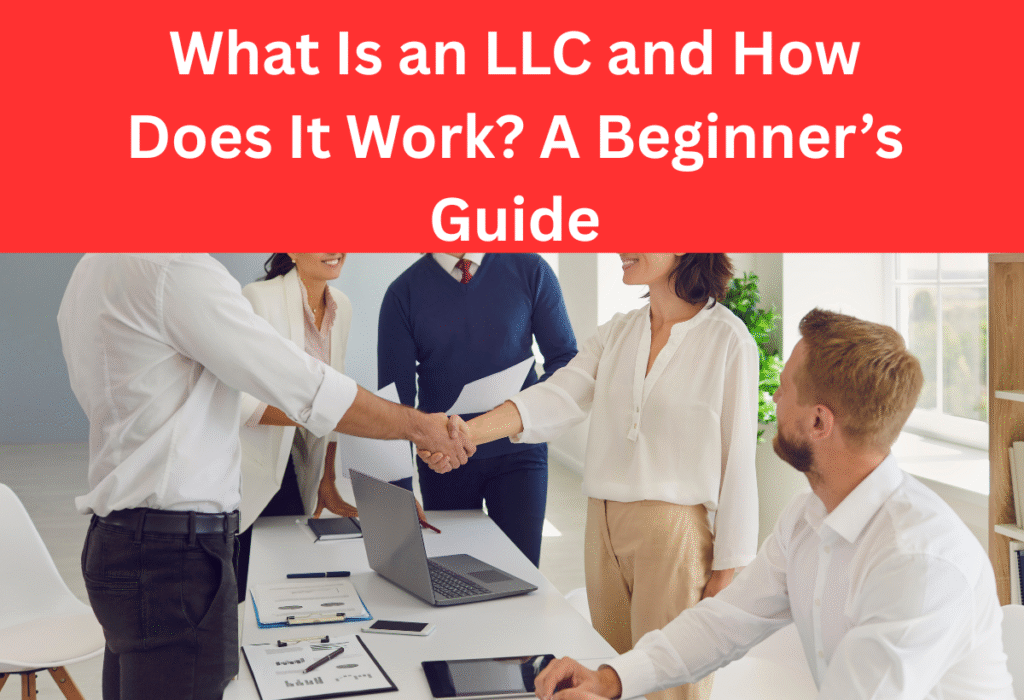If you’re new to the world of business ownership, you’ve probably heard the term LLC mentioned frequently. But what exactly is an LLC, and how does it work? This beginner’s guide is designed to break down everything you need to know about forming and operating a Limited Liability Company (LLC) in the United States.
Whether you’re a freelancer, a startup founder, or planning to launch your first small business, understanding what an LLC is can help you make more informed decisions and protect your personal and professional interests.

What Is an LLC?
An LLC, or Limited Liability Company, is a legal business structure that offers liability protection to its owners (known as members) while providing flexibility in taxation and management. It combines features of both corporations and sole proprietorships.
Key Features:
- Liability Protection: Owners are typically not personally liable for business debts or lawsuits.
- Pass-Through Taxation: Business income passes through to the owners’ personal tax returns.
- Flexible Management: No board of directors required; you can run it yourself or with others.
Keyword: what is an LLC
How Does an LLC Work?
An LLC works by creating a separate legal entity for your business. This means that the LLC itself can own assets, incur liabilities, and enter into contracts.
Members and Management
LLCs can have one or multiple members. Members can be individuals, other LLCs, or even corporations. Management can be member-managed (run by the owners) or manager-managed (run by designated managers).
Keyword: LLC structure and management
Taxes and the IRS
By default, the IRS treats single-member LLCs as sole proprietorships and multi-member LLCs as partnerships. However, you can choose to be taxed as an S-corporation or C-corporation by filing the appropriate forms.
Keyword: LLC tax options
Legal Compliance
LLCs must comply with state regulations, including filing formation documents, maintaining a registered agent, and submitting annual reports.
Keyword: LLC compliance requirements
Benefits of Forming an LLC
1. Limited Liability Protection
Your personal assets such as your home, car, and savings are generally safe from business debts or legal actions.
2. Tax Flexibility
You can avoid double taxation and elect to be taxed in a way that benefits your financial situation.
3. Operational Flexibility
You can operate the business yourself or hire managers. There’s no requirement for a board or annual meetings like with corporations.
4. Business Credibility
Adding “LLC” to your business name boosts trust and professionalism with clients and investors.
Keyword: benefits of an LLC
LLC vs. Other Business Types
| Business Type | Liability Protection | Tax Flexibility | Setup Complexity | Suitable For |
|---|---|---|---|---|
| Sole Proprietorship | No | No | Very Easy | Freelancers, solopreneurs |
| LLC | Yes | Yes | Moderate | Small to medium businesses |
| Corporation (C-Corp) | Yes | Limited | Complex | Large businesses, IPOs |
| S-Corporation | Yes | Some | High | Small businesses with payroll |
Common LLC Terminology Explained
- Articles of Organization: The document filed with the state to legally form your LLC.
- Operating Agreement: Outlines ownership and management structure.
- Registered Agent: A person or service designated to receive legal documents.
- EIN (Employer Identification Number): Like a Social Security Number for your business.
Keyword: LLC operating agreement, registered agent, EIN for LLC
How to Start an LLC in 5 Easy Steps
Step 1: Choose a Unique Business Name
Ensure it complies with your state’s naming rules and includes “LLC.”
Use your state’s business name search tool
Keyword: how to name an LLC
Step 2: Appoint a Registered Agent
This person or entity must reside in the state where your LLC is formed and is responsible for receiving official notices.
Keyword: registered agent for LLC
Step 3: File Articles of Organization
Submit this form to your state’s Secretary of State and pay the required fee (usually $50-$500).
Keyword: LLC formation documents
Step 4: Draft an Operating Agreement
Although not mandatory in all states, this document is essential for defining roles, responsibilities, and ownership stakes.
Keyword: LLC operating agreement template
Step 5: Apply for an EIN
Required to open a business bank account and file taxes. Apply for free on the IRS website.
Keyword: how to get an EIN for LLC
FAQs: What New Entrepreneurs Often Ask
Q: Do I need an LLC for a small side business?
A: If your side hustle involves risk or liability, forming an LLC can protect your personal assets.
Q: How long does it take to form an LLC?
A: Most states process LLC applications within a few days to a couple of weeks.
Q: Can a foreigner start an LLC in the U.S.?
A: Yes, non-U.S. residents can form and own an LLC in the U.S., though there may be additional tax implications.
Final Thoughts
Understanding what an LLC is and how it works is a critical first step for any aspiring entrepreneur. The LLC structure offers a unique blend of protection, flexibility, and professionalism—making it one of the most popular choices for new businesses in the U.S.
Before starting, be sure to consult a legal or tax advisor to ensure that forming an LLC is right for your specific business goals.